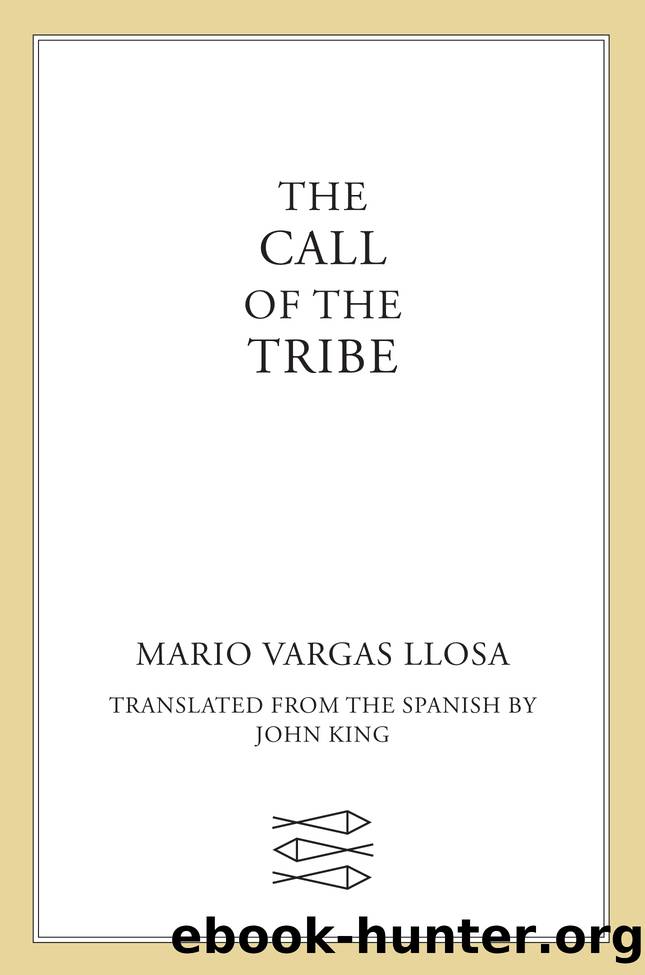The Call of the Tribe by Mario Vargas Llosa

Author:Mario Vargas Llosa
Language: eng
Format: epub
Publisher: Farrar, Straus and Giroux
THE CLOSED SOCIETY AND WORLD 3
At the dawn of human history there were no individuals, only the tribe, the closed society. The sovereign individual freed from this collective body that jealously closed in on itself in order to defend itself from wild animals, lightning bolts, evil spirits, and innumerable other fears of the primitive world, is a late creation of humanity. It takes shape with the appearance of the critical spiritâwith the discovery that the world and life are problems that can and must be solvedâthat is, with the development of rationalism and the right to exercise this rationalism independent of religious and political authorities.
According to Karl Popperâs theory, outlined in The Open Society and Its Enemies (1945), this frontier moment in civilizationâthe passage from a closed to an open societyâbegins in Greece with the pre-SocraticsâThales, Anaximander, Anaximenesâand achieved decisive momentum with Pericles and Socrates. The theory has also sparked much controversy, but, names and dates aside, the substantive part of his argument remains persuasive: that at some point, by accident or as a result of a complex process, for certain people knowledge stopped being magical and superstitious, a body of sacred beliefs protected by taboo, and a critical spirit emerged that subjected religious truthsâthe only ones acceptable until thenâto rational analysis and to comparison with practical experience. This transition, which occurred at the same time as trade broke up the isolation of the tribe, would lead to a prodigious flowering of science, arts, and technology, of human creativity in general, and also the birth of the singular, decollectivized individual and the foundations of a culture of freedom. For better or worse, since there is no way to prove that this move has brought us happiness, the detribalization of intellectual life would from then on gain pace and propel certain societies toward systematic development in every sphere. The beginning of an era of rationality and of critical thinkingâof scientific truthsâmeant that, at that moment in history, it would be âworld 3,â in Popperâs terms, that would have a decisive influence on social development.
Within the almost infinite series of nomenclatures and classifications that the wise and the fools have proposed to describe reality, Sir Karl Popperâs is the most transparent: âworld 1â is the world of natural and material objects; âworld 2â is the world of private mental or psychological states; and âworld 3â contains the products of the human mind. The difference between âworld 2â and âworld 3â is that the former encompasses the private subjectivity of every individual, their nontransferable ideas, images, sensations, and feelings, while the products of âworld 3,â although they stem from individual subjective experiences, have become public: scientific theories, legal institutions, ethical principles, characters in novels, philosophy, art, poetry, in short, our entire cultural heritage.
It is not fanciful to suppose that the most primitive state of civilization that regulates existence is âworld 1.â This world was organized on the basis of brute force and the rigors of natureâa lightning bolt, a drought, a lionâs clawsâwhich people were powerless to influence.
Download
This site does not store any files on its server. We only index and link to content provided by other sites. Please contact the content providers to delete copyright contents if any and email us, we'll remove relevant links or contents immediately.
| African | Asian |
| Australian & Oceanian | Canadian |
| Caribbean & Latin American | European |
| Jewish | Middle Eastern |
| Russian | United States |
4 3 2 1: A Novel by Paul Auster(12375)
The handmaid's tale by Margaret Atwood(7757)
Giovanni's Room by James Baldwin(7326)
Asking the Right Questions: A Guide to Critical Thinking by M. Neil Browne & Stuart M. Keeley(5757)
Big Magic: Creative Living Beyond Fear by Elizabeth Gilbert(5754)
Ego Is the Enemy by Ryan Holiday(5413)
The Body: A Guide for Occupants by Bill Bryson(5080)
On Writing A Memoir of the Craft by Stephen King(4935)
Ken Follett - World without end by Ken Follett(4723)
Adulting by Kelly Williams Brown(4565)
Bluets by Maggie Nelson(4547)
Eat That Frog! by Brian Tracy(4525)
Guilty Pleasures by Laurell K Hamilton(4439)
The Poetry of Pablo Neruda by Pablo Neruda(4097)
Alive: The Story of the Andes Survivors by Piers Paul Read(4018)
White Noise - A Novel by Don DeLillo(4002)
Fingerprints of the Gods by Graham Hancock(3996)
The Book of Joy by Dalai Lama(3976)
The Bookshop by Penelope Fitzgerald(3844)
